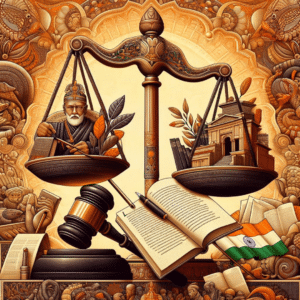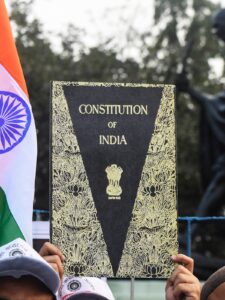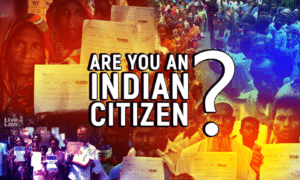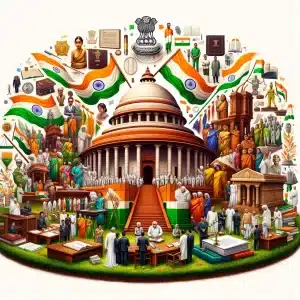Simplifying Your Life & Law | Legal Drafting services
Justice K.S.Puttaswamy (Retired). V. Union of India and Ors, 2017.
Citation: Writ Petition (Civil) No. 494 of 2012, (2017) 10 SCC 1
Court: Supreme Court of India
Parties Involved:
Appellant: Justice K S Puttaswamy (Retired)
Respondent: Union of India and Others.
Bench: Sanjay Kishan Kaul, Dhananjaya Y. Chandrachud, R. K. Agrawal, J. S. Khehar, S. A. Bobde, S. A. Nazeer, R. K. Agrawal, J. Chelameswar, A.M. Sapre JJ.0
Facts and Issues
The government made Aadhaar card mandatory for availing the government services and benefits. After that Former HC judge K.S. Puttaswamy filed a PIL against the Union of India saying that the Aadhaar card scheme in which data is collected by government agencies without any suitable legislation is transgressive of the right to privacy.
The Petitioner argued that the Right to Privacy is a fundamental right and should be guaranteed as the right to life and personal liberty under Article 21 of the Constitution. Whereas the respondent was not in favor of increasing the ambit of Article 21 by including the Right to Privacy in it. A Major issue raised was whether there is any fundamental right of privacy under the Constitution of India. An issue was put forward to evaluate the exactitude of the decision noted in Kharak Singh v. State of Uttar Pradesh and M. P. Sharma vs. Satish Chandra on the ground that it violates the Right to Privacy under Article 21 of the constitution.
Judgment
The Constitutionality of the Right to privacy was a Bone of contention till the unanimous judgment came in 2017 where the right to privacy got the constitutional status that categorically bequeaths the “right to life” to every person in India. It is an indispensable component of Part III of the Constitution of India. It was also declared that the right to privacy is not an absolute right and any invasion of privacy by state or non-state actors must satisfy the triple test which includes legitimacy, proportionality, and legality test. This was done to make a man’s life meaningful, total, and worth living. It was recognized that the right to privacy, enunciates the correct position of law. The bench was also anxious about the data protection mechanism in India and directed the state to come out with strong data security and data protection laws. Also, a committee chaired by Retired Justice B.N. Srikrishna was established to review data protection norms in the country and to make recommendations. The government of India was asked to examine and put in place a sturdy mechanism of data protection.
Case Comment
The Aadhaar scheme was one of the most earnest projects of the Government of India. It gave way to many privacy rights battles. Though it raised the question of dignity, informational self-determination, its solitary purpose was to empower the marginalized section of the society. A aadhaar card is a single point database for authentication so it can be used as an immobilizer by the government to stop anti-nationalist from performing any banking transactions as these all are linked via an Aadhaar card. Somehow the government has failed to fill the technological Vacuum due to which people are deprived of, subsidies and other welfare benefits. Also, the weak data protection mechanism is there in India and for that purpose, the Indian Privacy Code 2018 was drafted by legal experts, policy analysts, and lawyers. It also invites the suggestions of the public regarding data protection mechanisms. The government made new rules according to which central and state governments can directly approach the Unique Identification Authority of India to use unique 12 digits biometric numbers for corroboration in the interest of good governance and enabling innovation and spreading awareness. The agenda behind this was to ensure that beneficiaries get the benefit without delay. Earlier the private entity was also allowed to use Aadhaar authentication services according to section 57 but now it is limited only to government agencies according to the changes made in 2018. Also, many scams took place due to fake Aadhaar card issuance of fake ID cards in the wake of the Citizenship Amendment Act and the National Register of Citizens scare, default bank accounts, fingerprint authentication, identity theft, voting manipulation, etc. So we need to adopt a level ahead strategy and guarantee that abundant shields are placed in places for information security and protection India is a monstrous country with a different populace across the length and broadness with a few hindrances. Yet, when Aadhaar is connected, it will turn out to be exceptionally simple for the public authority to deal with its assets and administrations. This would give the public authority an exacting command over wrongdoings, abuse, and misrepresentation. There ought to be an appropriate instrument for the verification of individuals, who don’t have Aadhaar, and there ought to be an answer for the organization’s availability and ignorance issues because of which even individuals who have Aadhaar are not getting benefits. In the states like Assam, Odessa, Jharkhand, and Bihar, Aadhaar has prompted the isolation of destitute individuals in the payment of financed apportion. The main disadvantage which should be defeated is that there ought to be legitimate lawful solutions for violations like hacking, twofold Aadhaar card issues. Alongside fine, some safety efforts ought to be taken to decrease the abuse of Personal data consequently protecting the right to security of a person.
You may also like to read:
-
05 Jul 2021 OpinionMaratha Reservation: From Legislature of Precedent
-
16 Aug 2021 Know Your LawThe preamble to the Constitution of India
-
19 Aug 2021 Know Your LawCitizenship laws in India
-
24 Aug 2021 Know Your LawOther authorities under article "12" of Constitution of India
-
09 Sep 2021 Know Your LawCONCEPT OF LEGAL AID IN INDIA
-
12 Sep 2021 Know Your LawConstitution above all







